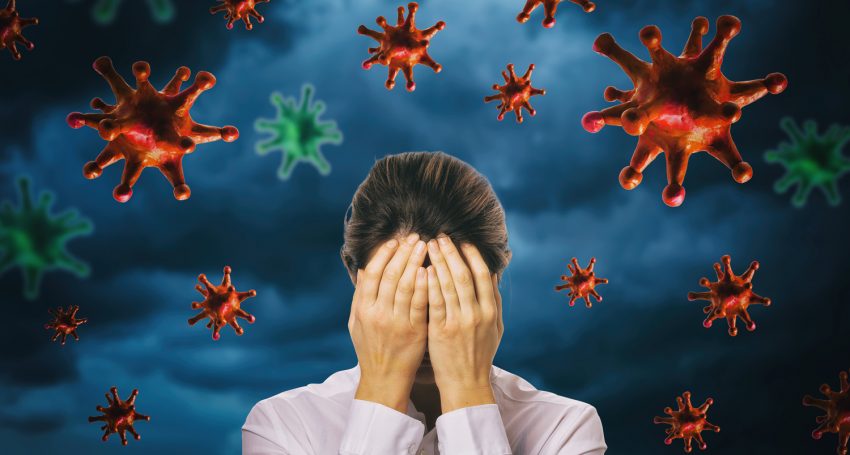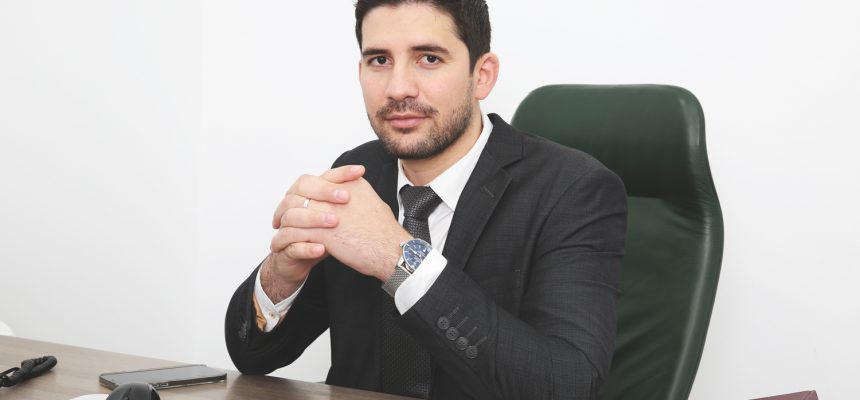Due to the coronavirus, 2020 became the year that divided life into “before” and “after” for the majority of Earth’s inhabitants. Seeing off this year, almost four months ago, we wished each other health and a speedy return to the usual way of life. We sincerely believed that the outgoing year would take with it all diseases, restrictions, lockdowns and anxieties caused by the global pandemic.
With childish naivety and, at best, holy faith, we went to bed on December 31, 2020 and woke up on January 1, 2021 in the same world, with the same global problems, only our internal resources having become less. It makes no sense to deny this, since any person close to health, in conditions of forced isolation, taking into account all the introduced restriction measures, will begin to deplete, both physically and psychologically.
In 2020, the global psychological community carried out a lot of research on the reaction of our psyche to events taking place in the world. Some of them turned out to be especially amusing and even phenomenal. For example, a study was conducted in a control group of patients with obsessive-compulsive disorder (OCD). This disorder is characterised by the involuntary appearance of obsessive, disturbing, or even frightening thoughts (obsessions). In the process of thinking, anxiety arises, from which the patient tries to get rid of, with the help of equally obsessive and tedious actions (compulsions). OCD can manifest as an abnormal need to wash your hands, continually re-checking if the iron or stove is off, the front door is closed, and more. So with the onset of the pandemic, patients with this disorder began to feel much better than before. They had a decrease in obsession and anxiety rates. Amazing, right?
It would seem that the whole world tensed in alarm from the real danger of the virus, while in someone’s psyche, on the contrary, perceived this as a signal for some relaxation and the possibility of healing. But there is also a downside to the story of the pandemic, in the context of the human psyche. On average, since the beginning of March 2020, in particular in Russia, the number of visits and hospitalisations to specialised institutions engaged in the protection of psychological health, prevention and treatment of mental disorders has increased significantly. And this is also, of course, an important and separate chapter in the development of mankind, the consequences of which we will observe for some time, calculated in years.
Nevertheless, time passes and the world is beginning to slowly recover from the impact of the pandemic, including through the means of transformation. We must admit that our beautiful island is still far from the recovery phase. The series of restrictions continues and the next lockdown does not add optimism. However, on the horizon, there is already a gap in physical freedom with the preservation of social distance. The question naturally arises: how to survive in all psycho-social processes of the pandemic, and how to maintain psychological and physical health? Yes, physicians around the world are actively monitoring physical health, but I propose to talk to us today about the preservation of the psyche and the prevention of psychosomatics, which, in turn, also has all the favourable conditions for flourishing.
And so, welcome to our internal processes of the psyche, during the lockdown period.
Anxiety, fear, powerlessness, apathy, depression, aggression – this is only a small part of everything that we live in during prolonged periods of self-isolation. The overwhelming majority of us are social people,
those who care about and need society: live communication, going out to cafes, restaurants and offices, playing sports and walking along the embankment. And this is normal, in society we are adaptive. We know how to communicate with people, with partners, make friends with families, and indeed enjoy communicating with many people, but not with ourselves. So what is it? What is behind all our “socialisation”? Why was it so difficult to spend time with your family, or alone with yourself, and at times just unbearable?
I think it’s no secret to anyone that against the backdrop of a pandemic, the world was covered with a wave of “spontaneous” divorces. Time itself seemed to have forced us to plunge headlong into what we once created and face the place from where we skilfully escaped into the very society. In addition to psychology, there is a lot of philosophy and culture in this lively topic. We can argue for a long time and, probably, everyone will feel their own response in some way, because ‘demons’ that have emerged from us during this period will be the same more or less. But what can you do about it? Let’s move on from reasoning to practical application. I want to bring to your attention a small algorithm, which by following it will help you save yourself and your loved ones at the final stages of the lockdown.
So, the first is a daily routine.
As practice has shown, many of us are so accustomed to the routine work schedule that working remotely it is extremely difficult to structure and tune in to any activity and work. This leads to a loss of motivation and energy, which in itself entails a loss of interest, a sense of meaninglessness, laziness and causes apathy and cessation. Yes, of course, there are a number of other features here, such as: children and the whole family are at home, a cup of tea and a refrigerator nearby, there is no need to go to the office, etc. but this is still a slightly different story – a story about the ability to organise a workspace.
What is the basis of the daily routine? These are the hours of sleep and wakefulness, as well as the hours of eating (breakfast, lunch, dinner). By the way, it is precisely the strict adherence to the daily routine that is the prevention of certain personality disorders and diseases, for example, depression.
The second is a time for solitude.
Any normal person needs time when he can be alone with his thoughts, in a calm and safe environment. To maintain your health, it is important to set aside at least 40 minutes a day for privacy. During these 40 sacred minutes, you can relax, release tension, be quiet, or simply balance yourself, regaining a sense of calm and poise. There is no definitive ‘pill’ of effectiveness for everyone, so you can try to meditate, listen to relaxation music, read a book, or just sit in an armchair looking at the ceiling. Show interest in yourself, listen, and find your unique sacred 40 minutes method.
The third is chatting with friends online. Learning opportunities.
As I said above, we are all social comrades. Communication is important to us, necessary, and sometimes even obligatory. And here technical progress comes to our aid. A huge number of messengers, social networks and applications with video communication will not let us forget about each other. Also, during the year of the pandemic, almost all large-scale training programs and projects were transferred online, thereby facilitating access to valuable information.
It is important to note and focus on the fact that the living human structure begins to ache, grow old and become ill when the so-called ‘stop’ in its development comes. Yes, we live in the 21st century, communicate on Skype and are socialised, nevertheless, initially we are all biological creatures that need
to grow and develop. For example, our brain can be figuratively compared to a muscle that needs to be pumped and well fed so that it is functional and works properly.
The fourth is physical activity.
Movement is life. If sports, health and a fit body are important to you, but you can only do jogging and only along the seashore, and everything else drives you into anger and despondency, then honestly ask yourself the question: why do I really need sports? By honestly answering this question to yourself, you will either stop being angry at the circumstances that prevent you from running along the sea and begin to engage in activities at home, or you will find a more effective solution to meeting your true need, in conditions of restriction which, in turn, in itself, will also have a positive effect on your emotional background. Do you want to be happy – then be happy! And now is the best time to stop deceiving yourself.
Fifth is creativity and self-expression.
Here we should start with the fact that creativity itself, as a process, is a very important component of our life. Creativity can fill us with ideas, inspiration and energy that we can transmit to the world. Remember what you wanted to do for a long time, but due to, for example, lack of resources, it was postponed all the time. Ask yourself, how could you express yourself through creativity? What do you need to hear the very ‘call of the creator’? There are many examples of creative self-expression. It remains only to decide what exactly suits you. And most importantly, turn off the inner critic figure. If, for example, you have thoughts that you are bad at drawing – tell yourself: “you criticise badly” – and go enjoy your creative expression. I always reiterate that there is a huge difference between art and creativity: in art, rules and the ability to follow them are important, and in creativity you and the ability to follow your feelings and sensations are important.
Yes, some time ago we got into the condition of the so-called ‘perfect storm’. A period of fear and a period of strong decline is an acute period of crisis. The time when you need to pay attention to the imperfections of the system, both your personal and general systems. Mark the points of growth. This period is passing. The speed of living will depend on the skill of orienting one’s self towards their values and inner support. After this period, a certain rollback occurs – a rollback back. During this period, a lot of old things die off, that which is no longer effective for you, that which has outlived itself. It is important to calmly part with this and let go of your expectations along with the hardships of unrealised plans.
The next stage is the ability to look at the field after a thunderstorm. This skill is evidence of the transition to a new level of development. And this, perhaps, is the very time – the time to collect stones, he time when you can take a fresh look and see your capabilities and directions of development. Every crisis makes us stronger. The key to maintaining psychological and physical health is the ability to adapt, subject to the preservation of your own values. This is exactly the ability, to develop that which, with the help of the above tools, we can overcome any adversity, including lockdown.
Take care of yourself and your time.
Be healthy.
Anna Danilova
Psychologist, psychotherapist. Member of the Presidential Reserve of the SRO National Union of Psychotherapists and Psychologists. Full member of the All-Russian Psychotherapeutic League. Member of the Association for Transpersonal Psychotherapy and Psychology.



